Related Research Articles

A concussion, also known as a mild traumatic brain injury (mTBI), is a head injury that temporarily affects brain functioning. Symptoms may include loss of consciousness (LOC); memory loss; headaches; difficulty with thinking, concentration, or balance; nausea; blurred vision; sleep disturbances; and mood changes. Any of these symptoms may begin immediately, or appear days after the injury. Concussion should be suspected if a person indirectly or directly hits their head and experiences any of the symptoms of concussion. It is not unusual for symptoms to last 2 weeks in adults and 4 weeks in children. Fewer than 10% of sports-related concussions among children are associated with loss of consciousness.
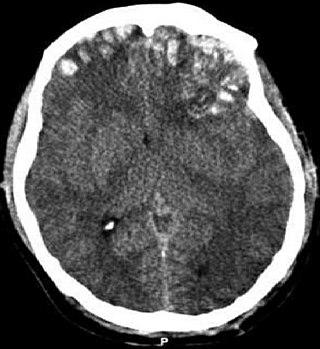
A traumatic brain injury (TBI), also known as an intracranial injury, is an injury to the brain caused by an external force. TBI can be classified based on severity, mechanism, or other features. Head injury is a broader category that may involve damage to other structures such as the scalp and skull. TBI can result in physical, cognitive, social, emotional and behavioral symptoms, and outcomes can range from complete recovery to permanent disability or death.

Physical medicine and rehabilitation, also known as physiatry, is a branch of medicine that aims to enhance and restore functional ability and quality of life to people with physical impairments or disabilities. This can include conditions such as spinal cord injuries, brain injuries, strokes, as well as pain or disability due to muscle, ligament or nerve damage. A physician having completed training in this field may be referred to as a physiatrist.
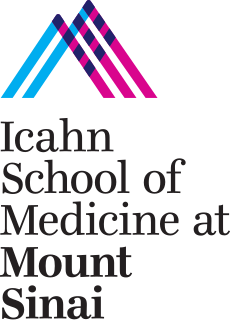
The Icahn School of Medicine at Mount Sinai, formerly the Mount Sinai School of Medicine, is a private medical school in New York City. It is the academic teaching arm of The Mount Sinai Health System, which manages eight hospital campuses in the New York metropolitan area, including Mount Sinai Hospital and the New York Eye and Ear Infirmary.
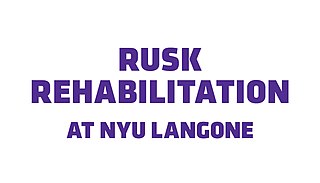
Rusk Rehabilitation is the world's first and among the largest university-affiliated academic centers devoted entirely to inpatient/outpatient care, research, and training in rehabilitation medicine for both adults and pediatric patients. The system is part of the NYU Langone Medical Center and operated under the auspices of the Department of Rehabilitation Medicine of the New York University School of Medicine. The Rusk Institute is named in honor of its founder, Howard A. Rusk.
Ross D. Zafonte is an American board-certified physiatrist known for his academic work in traumatic brain injury and is recognized as an expert in his field. His textbook, Brain Injury Medicine: Principles and Practice, is regarded as a standard in brain injury care. Zafonte has spoken at national and international conferences about traumatic brain injury, spasticity and other neurological disorders, and has authored more than 300 peer review journal articles, abstracts and book chapters. He serves on the editorial board of the Journal of Neurotrauma and NeuroEngineering and Rehabilitation.
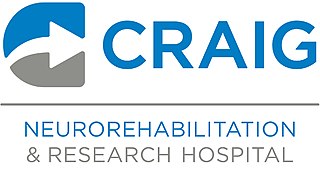
Craig Hospital is a neurorehabilitation and research hospital in Englewood, Colorado specializing in spinal cord injury (SCI) and traumatic brain injury (TBI) rehabilitation and research. Craig is a 93-bed, private, not-for-profit, free-standing long-term acute care and rehabilitation hospital that provides a comprehensive system of inpatient and outpatient medical care, rehabilitation, neurosurgical rehabilitative care, and long-term follow-up services. Half of Craig's patients come from outside of Colorado each year, and in the past four years Craig has treated patients from all 50 states and several foreign countries. At any given time, the staff at Craig treats approximately 55 inpatients with spinal cord injuries, 30 with traumatic brain injuries, and 50-60 outpatients. Craig provides housing for out-of-state families and outpatients, including the first 30 days free for families of new inpatients.
The Kessler Foundation was established in 1985 and is one of the largest public charities in the United States supporting people with disabilities. Kessler Foundation Research Center has research programs designed to improve function and quality of life for persons with spinal cord and traumatic brain injury, stroke, multiple sclerosis and other neurological and orthopedic conditions. Kessler Foundation has also distributed millions of dollars to programs that promote the employment of people with disabilities through its "Transition to Work" Signature and Community Employment grants. The Foundation's Special Initiative grants also support related community programs like ThinkFirst, an injury prevention program for children. Kessler Foundation has a full-time staff of 90 individuals, divided between two locations in West Orange, NJ.
Aaron E. Miller, M.D. is an American neurologist, the first Chairman of the Multiple Sclerosis section of the American Academy of Neurology (AAN) and recognized as a multiple sclerosis clinician.
David Xavier Cifu is an American physiatrist, researcher, and medical educator. He is the Associate Dean for Innovation and System Integration in the School of Medicine at Virginia Commonwealth University School of Medicine, the chairman and Herman J. Flax M.D. Professor of the Department of Physical Medicine and Rehabilitation (PM&R) at Virginia Commonwealth University (VCU) in Richmond, Virginia, staff physiatrist at the Hunter Holmes McGuire Veterans Administration Medical Center (HHM-VAMC), founding director of the VCU-Center for Rehabilitation Science and Engineering and senior TBI specialist in the Department of Veterans Affairs' Veterans Health Administration.
Samuel E. Gandy, M.D., Ph.D. is a neurologist, cell biologist, Alzheimer's disease (AD) researcher and expert in the metabolism of the sticky substance called amyloid that clogs the brain in patients with Alzheimer's. His team discovered the first drugs that could lower the formation of amyloid.
Kristjan T. Ragnarsson, M.D., is an American physiatrist with an international reputation in the rehabilitation of individuals with disorders of the central nervous system. He is currently the Dr. Lucy G. Moses Professor and Chair of Rehabilitation Medicine at The Mount Sinai Medical Center in New York City.
TIRR Memorial Hermann is a 134-bed rehabilitation hospital, rehabilitation and research center, outpatient medical clinic and network of outpatient rehabilitation centers in Houston, Texas that offers physical rehabilitation to patients following traumatic brain or spinal injury or to those suffering from neurologic illnesses. In 2014, U.S. News & World Report named TIRR Memorial Hermann to the list of America's Best Hospitals for the 25th consecutive time.
Andy S. Jagoda is an American physician and Professor and Chair Emeritus of the Department of Emergency Medicine at Mount Sinai Hospital in New York City. He has edited and authored 14 books, including The Good Housekeeping Family First Aid Book and the textbook Neurologic Emergencies. He is an editor of the 9th edition of Rosen’s Emergency Medicine.

Segun Toyin Dawodu is a Nigerian Physiatrist and lawyer with the WellSpan Health, he served as an Associate Professor of Pain Medicine at Albany Medical College.
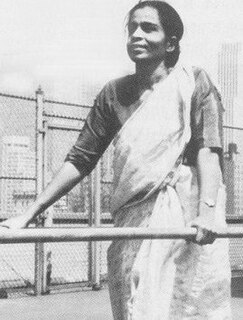
Mary Puthisseril Verghese (1925–1986) was a physician in India who was among the earliest pioneers of Physical medicine and rehabilitation in the country. Mary Verghese was instilled in a home where love and respect were two main factors in their close knit family. She was caring of others and wanted to give back to her community in any way that she could. In 1963, she took charge of what was the first department of Physical Medicine and Rehabilitation with an inpatient facility in India at the Christian Medical College, Vellore. She was instrumental in expanding the services of the department with the establishment of the first inpatient rehabilitation institute of the country in 1966. In recognition of her contributions to the field of medicine, she was awarded the Padma Shri by the Government of India in 1972.
Jennie Louise Ponsford is an Australian neuroscience researcher at Monash University, Victoria who has a special interest in Traumatic Brain Injury (TBI). Jennie is a clinical neuropsychologist, whose work is focused on developing a deeper understanding of the negative consequences of TBI, particularly those related to fatigue, sleep disturbance, attentional problems, mood and behavioural disturbances, and the development of rehabilitation interventions to improve long term recovery and quality of life in individuals with TBI.
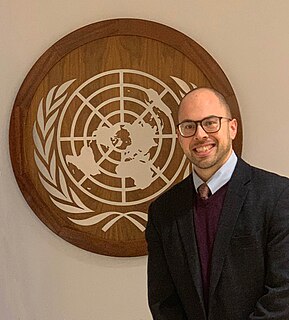
John-Ross (JR) Rizzo, M.D., M.S.C.I., is an American physician-scientist at NYU Langone Medical Center. He is an Associate Professor, serving as Health System Director of Disability Inclusion at NYU Langone Medical Center and Vice chair of Innovation and Equity for the Department of Physical medicine and rehabilitation at Rusk Institute of Rehabilitation Medicine, with cross-appointments in the Department of Neurology and the Departments of Biomedical & Mechanical and Aerospace Engineering New York University Tandon School of Engineering. He is also the Associate Director of Healthcare for the NYU WIRELESS Laboratory in the Department of Electrical and Computer Engineering at New York University Tandon School of Engineering. He leads the Visuomotor Integration Laboratory (VMIL), where his team focuses on eye-hand coordination, as it relates to acquired brain injury, and the REACTIV Laboratory, where his team focuses on advanced wearables for the sensory deprived and benefits from his own personal experiences with vision loss.

Alison Nenos Cernich is an American neuropsychologist specializing in traumatic brain injury and computerized neuropsychological assessment. She is the deputy director of the Eunice Kennedy Shriver National Institute of Child Health and Human Development. Cernich was previously deputy director of the Defense Centers of Excellence for Psychological Health and Traumatic Brain Injury, assistant professor of neurology at University of Maryland School of Medicine, and chief of neuropsychology at the VA Maryland Health Care System.

Eli Vakil is an Israeli clinical neuropsychologist. Vakil is a professor emeritus and former departmental chairman of the Department of Psychology, and the head of the Memory and Amnesia Lab at the Gonda (Goldschmied) Multidisciplinary Brain Research Center at Bar Ilan University. He is also director of the Rehabilitation Center for Veterans after Traumatic Brain-Injury (TBI) in Jaffa, Israel.